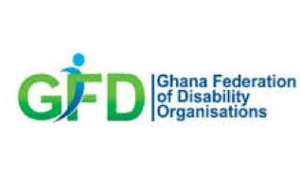- Home - News
- Polls
- Year In Review
- News Archive
- Crime & Punishment
- Politics
- Regional
- Editorial
- Health
- Ghanaians Abroad
- Tabloid
- Africa
- Religion
- Election 2020
- Coronavirus
- Photo Archives
- News Headlines
- Press Release
General News of Tuesday, 17 March 2020
Source: GNA
GFDO calls on Parliament to push implementation of the Disability Act
The Ghana Federation of Disabled Organisation (GFDO) has called on Parliament to ensure that key provisions in the Persons with Disability Act 2006 (Act 715) are implemented to enhance the living conditions of Persons With Disabilities (PWDs) in the country.
Ms Sirina Mahamadu, the Bono Regional Vice President of the Federation, said the passage of the Act 715 seems irrelevant because it has not added any significant impact or improvement into the lives of the PWDs.
This is because successive governments have not demonstrated any political will and failed in its implementation since Parliament passed the Act in 2006.
The Persons with Disability Act, 2006 (Act 715) makes it mandatory for all buildings to which the public has access to be fitted with disability-friendly facilities to make them accessible to PWDs; this is the sole responsibility of the owner or occupier of such buildings.
But, speaking at a policy dialogue meeting held at Abesim in the Sunyani Municipality on Wednesday, Ms Mahamadu, a paralegal, expressed regret that years after enactment of the law, not much progress had been made towards the implementation.
Apart from that, she said, Ghana had also been a signatory to the UN Conventions on the Rights of People with Disabilities for decades, but the nation has failed to implement protocols in the convention which seeks to improve the living conditions of the PWDs.
The meeting was organised by the International Federation of Women Lawyers (FIDA-Ghana), in partnership with STAR-Ghana, under the Gender Inclusion and Voices on Equality Sustained (GIVES) project.
Attended by state and non-state actors, civil society organisations, paralegals, and Gender Exclusion Social Inclusion (GESI) groups such as Persons with Disabilities (PWDs), women living with HIV and AIDS, it was aimed at sharing findings of the assessment of inclusive data at the Domestic Violence Victims Support Unit (DOVVSU) in the three interventions sites of the GIVES project.
In addition, the meeting ascertained targeted services provided to the GESI groups by DOVVSU and strategies for public financing of legal aid for the GESI groups.
Ms Mahamadu said though Act 715 enjoins state institutions and organisations to ensure the safety and interest of the PWDs, this was largely being ignored as many public and private buildings, places of convenience and public transport remained inaccessible to people with physical disabilities.
Mrs Susan Aryeetey, the Acting Executive Director, FIDA-Ghana, an association of women lawyers that works to promote and enhance the status of women and children in society, expressed regret that GESI groups in the country were always denied access to justice because they could not afford the cost of legal fees.
This is a total breach of section two of the Article 294 of the 1992 constitution of which every person was entitled to legal aid, she said. Mrs Aryeetey said the cost of legal fees was very high and called on the government to adequately resource and strengthen the Legal Aid Commission to enable it deliver its mandate effectively.
She said the lack of personnel remains a key challenge confronting the Commission saying as at October 2018, the Commission had only 21 lawyers and 40 alternative dispute resolution personnel in the country.
Mrs Aryeetey said if the Commission was adequately resourced, it would be in a better position to render services to the GESI and other vulnerable groups to access justice.
Mr Peter Nyame, the Bono Regional Administrator of the Legal Aid Commission, said the Commission has received several applications, and it was left for government to give it clearance to employed more staff and lawyers.
Madam Justina Owusu-Banahene, the Sunyani Municipal Chief Executive, told the GESI groups she really understood their problems and what they were going through, and assured the Assembly’s commitment to help alleviate their plight.
She said disability was not inability and there is the need for the PWDs and the GESI groups to find something worth doing to enable the assembly to support them.
Entertainment










